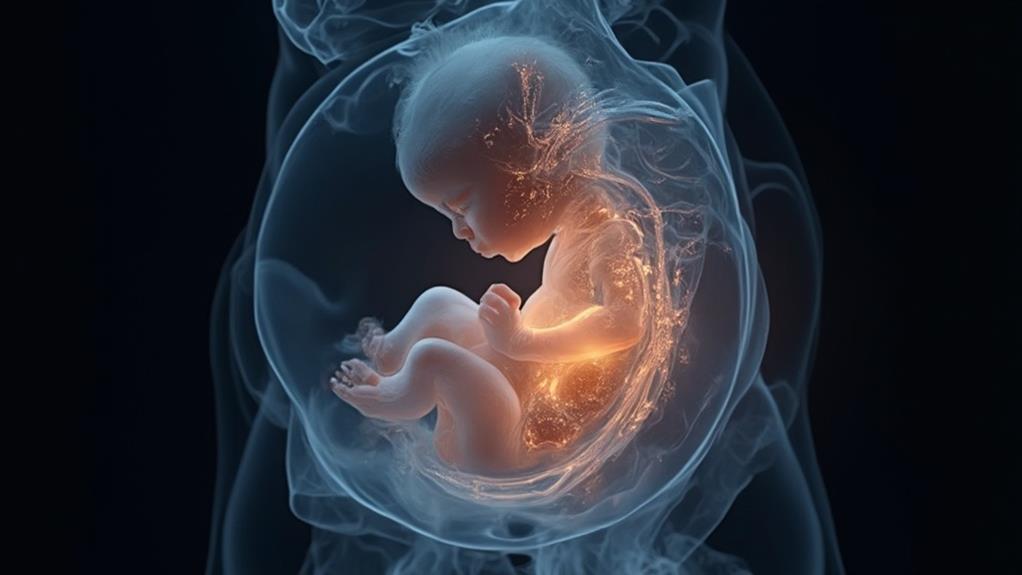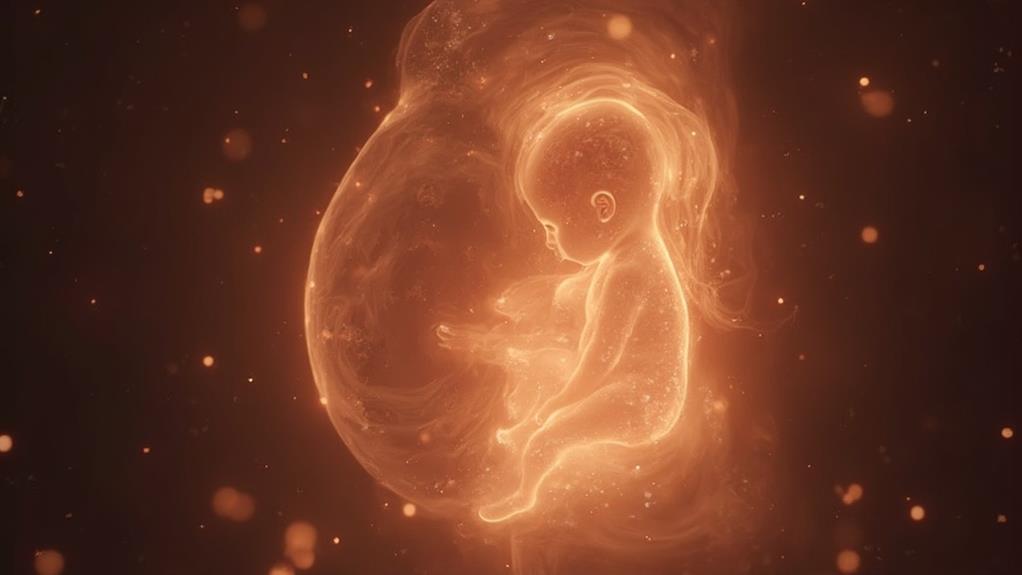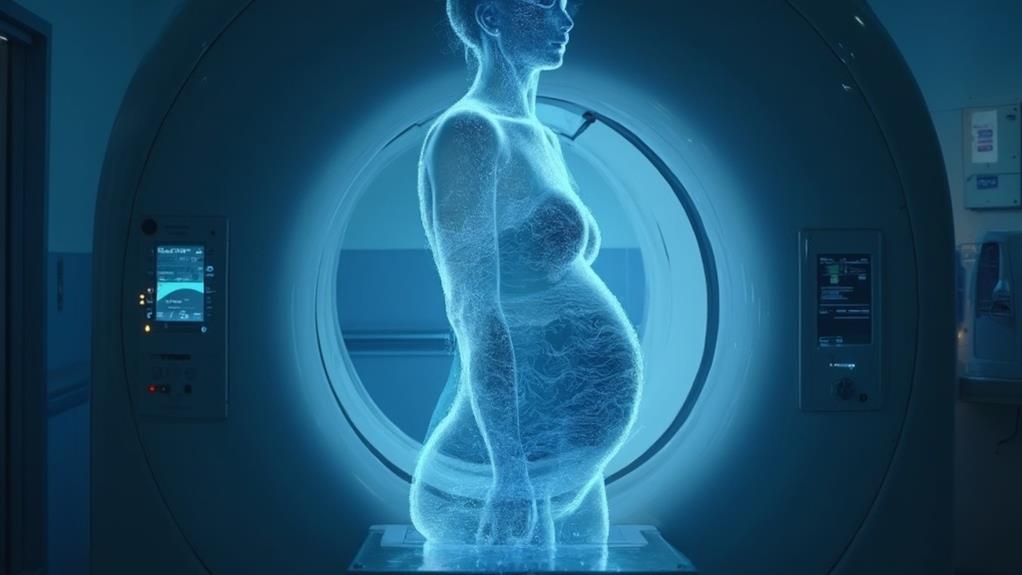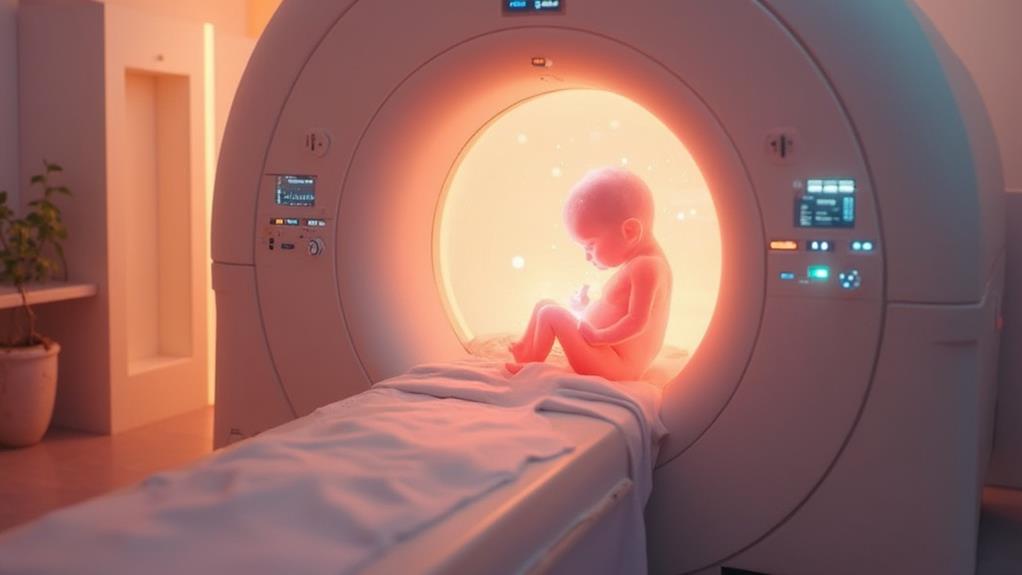MRI during pregnancy is a valuable diagnostic tool to assess both fetal and maternal health. It helps in diagnosing fetal anomalies, placental issues, and conditions like intrauterine growth restriction. For mothers, MRIs can detect placental abnormalities and differentiate causes of pelvic pain. A significant benefit is its ability to provide high-resolution images without using ionizing radiation, making it safer than X-rays or CT scans. Despite its advantages, there are uncertainties about its long-term effects, necessitating cautious use. Healthcare providers must balance the benefits and potential risks, ensuring maternal and fetal safety. To understand more, additional information is essential.
MRI Highlights
- MRIs provide high-resolution imaging for diagnosing fetal anomalies and maternal conditions without ionizing radiation.
- Early detection of abnormalities via MRI can improve planning for labor and delivery.
- MRIs are non-invasive, offering a safer alternative to X-rays or CT scans for pregnant women.
- The long-term impact of MRI on fetal development is not fully understood, necessitating more research.
- Inconsistent guidelines and lack of definitive data can lead to variable use of MRIs during pregnancy.
Purpose of MRI During Pregnancy

The primary purposes of MRI during pregnancy include evaluating fetal health, diagnosing maternal conditions, and leveraging high-resolution imaging benefits. This non-invasive imaging technique provides detailed information that is essential for monitoring the development of the fetus and identifying any potential abnormalities.
MRI scans are particularly beneficial because they produce clearer and better diagnostic images compared to other modalities. Additionally, MRI is instrumental in assessing various maternal health issues, contributing to safer pregnancy management.
Assessing Fetal Health
Many situations necessitate the use of MRI during pregnancy to inspect fetal health thoroughly. MRI provides detailed images of the fetus's anatomy, proving invaluable when ultrasound results are inconclusive. It is instrumental in diagnosing congenital anomalies, such as neural tube defects or brain malformations, helping healthcare providers determine the most appropriate course of action for fetal care and management.
MRI's ability to produce high-resolution images without using ionizing radiation makes it a safe option for both mother and fetus. This imaging modality excels at evaluating complex structures, such as the brain and spine, where precise detail is critical. It is also beneficial for examining the placenta and umbilical cord, addressing issues like placental insufficiency or abnormal cord insertion that may impact fetal health.
Furthermore, fetal MRI can offer critical insights into the growth and development of organs, providing clarity in cases of suspected intrauterine growth restriction or inspecting the severity of conditions like diaphragmatic hernia. Early and accurate diagnosis allows for better planning and intervention, potentially improving both perinatal outcomes and long-term health. Consequently, MRI serves as an essential tool in the meticulous evaluation of fetal well-being during pregnancy.
Diagnosing Maternal Conditions
Certain maternal conditions require the use of MRI during pregnancy to ascertain accurate diagnosis and effective management. An MRI is particularly helpful when other imaging modalities, such as ultrasound, prove inadequate. This advanced technique can identify various complex conditions that might jeopardize maternal health if left undiagnosed or untreated.
Key maternal conditions, discernible through MRI, impacting both maternal and fetal outcomes include:
- Placental abnormalities: Detection of conditions like placenta accreta, where the placenta attaches too deeply into the uterine wall, verifying timely surgical planning and intervention.
- Pelvic and abdominal pain evaluation: Differentiating between appendicitis, ovarian torsion, or other critical conditions, thereby preventing complications through early treatment.
- Neurological conditions: Identifying potential brain and spine issues, like brain tumors or spinal cord malformations, which might necessitate specific medical or surgical interventions.
- Musculoskeletal assessments: Detecting ligament injuries or other musculoskeletal abnormalities to manage pain and mobility concerns effectively.
Utilizing MRI during pregnancy for these diagnoses guarantees both maternal safety and well-being. The precision this technology offers is invaluable for healthcare providers aiming to deliver the best possible care to expectant mothers, addressing conditions promptly and with precision. This careful approach underscores the commitment of medical professionals dedicated to safeguarding maternal health.
High-Resolution Imaging Benefits
MRI stands out as an exceptionally precise tool for high-resolution imaging during pregnancy, capturing detailed images that surpass the capabilities of other diagnostic methods. This advanced imaging technology provides clear and comprehensive views of both maternal and fetal conditions, aiding healthcare providers in making informed decisions.
The high-resolution capabilities of MRI make it particularly valuable for evaluating complex conditions, such as placental abnormalities or fetal anatomical structures, which might not be as clearly visualized through ultrasound or other diagnostic techniques.
One of the primary benefits of high-resolution imaging through MRI is its ability to identify subtle differences in tissue composition and anomalies that might be missed otherwise. This level of detail is indispensable for early diagnosis and intervention, ensuring that both mother and child receive the best possible care. Additionally, MRI does not use ionizing radiation, making it a safer alternative for imaging during pregnancy when radiation exposure is a concern.
Furthermore, high-resolution MRI is invaluable in planning for delivery, especially in cases where intricate anatomical details must be understood preoperatively. By providing an unparalleled level of detail, MRI equips medical professionals with essential insights, ultimately supporting better outcomes for pregnant patients and their developing babies.
Benefits

Magnetic Resonance Imaging (MRI) offers several benefits during pregnancy by enabling early detection of potential issues, consequently facilitating timely interventions. As a non-invasive imaging technique, MRI provides a safe alternative for detailed fetal health evaluations without exposing the expectant mother to ionizing radiation, thereby contributing to a safer prenatal care environment.
In addition to gauging fetal health, MRI can be beneficial in evaluating maternal conditions like headaches and vision issues, which may impact pregnancy. These advantages underscore MRI's critical role in monitoring and ensuring maternal-fetal well-being.
Early Detection Advantages
The importance of early detection in pregnancy cannot be overstated, as it provides numerous benefits to both the mother and the developing fetus. Utilizing advanced technologies like MRI aids in identifying potential issues at the earliest stages, thereby facilitating prompt medical intervention that can greatly improve outcomes. Early detection allows healthcare professionals to monitor fetal development more effectively, ensuring that both common and rare complications can be addressed swiftly and appropriately.
Early detection through the use of MRI offers a range of advantages, ensuring a safer and healthier pregnancy journey. These include:
- Timely identification of fetal abnormalities: This allows for earlier intervention, which can be pivotal for the health and development of the fetus.
- Enhanced monitoring of maternal health: Conditions such as preeclampsia can be detected and managed sooner, reducing risks to both mother and baby.
- Better planning for labor and delivery: With more information available, healthcare providers can make informed decisions, potentially avoiding emergency situations.
- Increased peace of mind for expectant parents: Knowing that potential issues are being monitored closely can reduce anxiety and provide emotional comfort.
The use of MRI in early detection exemplifies a commitment to ensuring the best possible care for both mother and child, embodying the very essence of compassionate healthcare.
Non-invasive Imaging Technique
Non-invasive imaging techniques, such as those offered by MRI, provide significant benefits during pregnancy by eliminating the need for potentially harmful procedures. MRI, or Magnetic Resonance Imaging, employs strong magnetic fields and radio waves to generate detailed images of the body's internal structures. These methods steer clear of ionizing radiation used in X-rays or CT scans, which can pose risks to both the mother and the developing fetus.
The non-invasive nature of MRI makes it an attractive option for monitoring maternal and fetal health. It provides clear, high-resolution images that help healthcare providers diagnose and manage conditions without introducing physical risks. This can lead to more informed decision-making, ultimately improving patient care. For expectant mothers, MRI offers peace of mind, as the safety of their unborn child is paramount.
Moreover, MRI is particularly effective in visualizing soft tissues, making it useful for identifying abnormalities in organs and tissues that are otherwise difficult to assess. By providing detailed anatomical information, MRI can assist in planning medical interventions that are both timely and minimally invasive. This guarantees that both mother and baby receive ideal care throughout the pregnancy, upholding the highest standards of medical practice.
Fetal Health Assessment
Evaluating fetal health is a vital component of prenatal care, and MRI stands out for its unique benefits in this domain. Unlike other imaging techniques, MRI provides exceptional detail without the need for ionizing radiation, offering a safe and precise method to assess fetal development and detect abnormalities.
The benefits of using MRI in fetal health assessment include:
- High-resolution images: MRI produces detailed images, essential for diagnosing complex congenital anomalies that ultrasound might miss.
- Enhanced soft tissue differentiation: It differentiates between types of tissue with high fidelity, which is indispensable for identifying conditions such as fetal brain anomalies.
- Comprehensive evaluation: MRI allows for a thorough examination of the fetal anatomy, providing invaluable information to guide medical decisions and interventions.
- Non-invasive and safe: MRI does not use ionizing radiation, making it safe for both the mother and the fetus, which is paramount in prenatal care.
These benefits underscore MRI's central role in advanced fetal health assessment. For parents and healthcare providers dedicated to ensuring the best outcomes, MRI is an indispensable tool, offering peace of mind through its accuracy and safety. By utilizing MRI, we can enhance prenatal care, contributing to healthier pregnancies and better future prospects for the unborn child.
Minimizing Radiation Exposure
With the clear advantages MRI offers in fetal health assessment highlighted, attention naturally turns to the importance of reducing radiation exposure—a critical consideration in prenatal care. Magnetic Resonance Imaging (MRI) stands out because it does not utilize ionizing radiation, unlike traditional imaging techniques such as X-rays and computed tomography (CT) scans. This absence is critical as ionizing radiation can pose significant developmental risks to the fetus, potentially leading to malformations or other serious health problems.
Utilizing MRI, healthcare providers can perform thorough assessments without exposing the mother or fetus to these harmful effects. MRI leverages strong magnetic fields and radio waves to produce detailed images, guaranteeing that expectant mothers receive necessary diagnostic information without additional risks. This characteristic makes MRI particularly advantageous in monitoring fetal development and diagnosing potential complications.
Moreover, minimizing radiation exposure aligns with broader health initiatives aimed at reducing unnecessary medical interventions, further safeguarding long-term maternal and fetal well-being. By choosing MRI, healthcare providers not only adhere to best practices in prenatal care but also demonstrate a commitment to prioritizing the utmost safety standards. This ensures the health and vigor of both mother and child through the precise, non-invasive diagnostic capabilities MRI offers.
Potential MRI Drawbacks

While MRI scans offer many benefits during pregnancy, there are some potential drawbacks that warrant attention. Possible health risks, the noise and claustrophobia associated with the procedure, and the modest impact of information are all important considerations. The table below highlights these potential drawbacks:
| Drawback | Description | Potential Impact |
|---|---|---|
| Possible Health Risks | Concerns about the effect of strong magnetic fields on the fetus. | Needs further study for long-term implications. |
| Noise and Claustrophobia | Loud noises from the MRI machine can cause discomfort, and confined spaces may induce anxiety. | Can affect patient comfort and cooperation. |
| Limited Information Impact | MRI may not appreciably alter clinical decisions in all cases. | May not justify the costs or risks involved. |
Possible Health Risks
Magnetic Resonance Imaging (MRI) is generally regarded as a safe diagnostic tool, but its use during pregnancy requires careful consideration due to potential health risks. The primary concern revolves around the effects of the strong magnetic fields and radiofrequency energy used during the procedure.
Though no conclusive evidence shows direct harm to the fetus, some potential risks warrant attention and caution.
- Heating Effects: Extended exposure to radiofrequency energy might cause tissue heating, which could impact fetal development.
- Acoustic Noise: High levels of noise generated by the MRI machine could potentially affect fetal hearing if no protective measures are taken.
- Contrast Agents: The use of gadolinium-based contrast agents is generally discouraged during pregnancy due to the potential risk of nephrogenic systemic fibrosis and unknown effects on the fetus.
- Magnetic Fields: While there are no proven long-term effects, the strong magnetic fields could theoretically influence the developing brain and tissues in unknown ways.
Healthcare providers must evaluate the necessity of the MRI against these potential risks. In many cases, alternative imaging techniques, such as ultrasound, are preferred during pregnancy to minimize any risks to both the mother and the unborn child.
Noise and Claustrophobia
In addition to the potential health risks of MRI during pregnancy, there are practical drawbacks that must be considered. One significant issue is the noise generated by the machine, which can be quite loud and potentially distressing. The MRI scanner produces acoustic noise that can reach levels as high as 120 decibels, comparable to the noise level of a chainsaw. For pregnant women, this overwhelming auditory stimulus can cause discomfort and anxiety.
Another important factor is the enclosed environment of the MRI machine. Many patients experience claustrophobia during the procedure, feeling trapped or confined in the narrow space of the scanner. This can lead to heightened stress and anxiety, which is particularly concerning for expectant mothers who may already be experiencing heightened emotional sensitivity.
It is essential for healthcare providers to address these concerns by offering support and reassurance throughout the process. Providing noise-canceling headphones or earplugs can help mitigate the impact of the loud sounds. Additionally, explaining the procedure thoroughly beforehand and ensuring a caring, empathetic approach can alleviate feelings of claustrophobia. Ultimately, attention to these practical drawbacks is pivotal in delivering compassionate and effective care for pregnant patients undergoing MRI scans.
Limited Information Impact
Traversing the landscape of MRI scans during pregnancy is inherently complex due to limited information on long-term effects. While MRIs are an invaluable diagnostic tool, their use during pregnancy remains a contentious issue. The scarcity of extensive studies leaves healthcare providers exploring a gray area, accentuated by the absence of definitive long-term data.
MRI technology employs strong magnetic fields and radiofrequency pulses, the impact of which on developing fetal tissues over extended periods is not fully understood. This gap in knowledge can lead to:
- Uncertainty and anxiety for expectant mothers: The lack of conclusive evidence may cause stress and concern about the potential risks to their unborn child.
- Hesitation among healthcare providers: Physicians might delay or avoid recommending MRIs during pregnancy, worrying about unknown consequences.
- Potential underutilization of a diagnostic tool: Critical conditions that could be better evaluated with an MRI might be overlooked due to caution.
- Inconsistent medical guidelines: Differing protocols can emerge across institutions, leading to variability in patient care.
Addressing these ambiguities requires robust research to elucidate the long-term effects of MRIs on fetal development. Until then, healthcare providers must weigh the benefits and risks carefully, ensuring that the well-being of both mother and child remains paramount.
MRI FAQ
Is It Safe to Have an MRI if I'm in My First Trimester?
The safety of undergoing certain medical procedures during the first trimester requires careful consideration. Consulting with your healthcare provider is essential to evaluate potential risks and benefits specific to your individual health needs and circumstances.
Can an MRI Affect Breastfeeding After Pregnancy?
MRI procedures are generally considered safe for breastfeeding mothers, as the magnetic fields and radio waves do not affect breast milk. However, always consult your healthcare provider to address any specific concerns related to your health condition.
How Do I Prepare for an MRI During Pregnancy?
To prepare, inform the radiologist about your pregnancy, avoid eating or drinking before the scan if contrast is used, and wear comfortable, loose-fitting clothes. Additionally, confirm all safety protocols with your healthcare provider.
Can the MRI Noise Harm My Unborn Baby?
MRI machine noise, though loud, is not known to harm unborn babies. The MRI is typically considered safe for both the mother and fetus, especially when conducted with the appropriate precautions and under medical supervision.
Are There Any Alternatives to MRI for Pregnant Women?
Yes, alternatives to MRI for pregnant women include ultrasound, which is the preferred imaging modality due to its safety and effectiveness, and potentially low-dose CT scans if absolutely necessary. Each option should be considered with clinical guidance.
